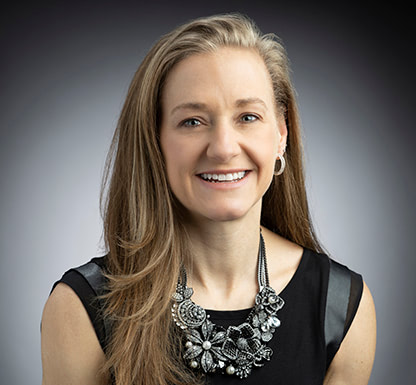

Stephanie Caporaletti supervises the Health and Human-Machine Systems Group in the Lab’s Asymmetric Operations Sector. Her multidisciplinary team includes systems engineers, biomedical engineers, data scientists, cognitive experts and social scientists who are also demographically diverse. They work together to solve problems that are equally wide-ranging, from warfighter health and readiness to precision medical care.
We’re able to bring together people who have a variety of skills, a variety of backgrounds, and then address problems that are technically complex. That’s at the heart of everything we do at APL, and if we were just trying to tackle those problems with a unilateral approach, we’d miss out.
Caporaletti knows that a key to success is ensuring an open and inclusive environment where people can share ideas and have hard conversations.
“That’s what gives us immense power,” she said. “We’re able to bring together people who have a variety of skills, a variety of backgrounds, and then address problems that are technically complex. That’s at the heart of everything we do at APL, and if we were just trying to tackle those problems with a unilateral approach, we’d miss out.”
Caporaletti’s team lives and breathes this every day. For example, they’re currently helping the Navy determine when sailors and Marines are 1) healthy and medically ready for deployment and 2) properly matched to mission requirements as part of deployment decision-making.
“This work brings together systems engineers who understand the problem from the military’s perspective and staff who are extremely skilled in developing algorithms and using machine learning to assess disparate datasets,” Caporaletti said. “They can conduct notable analyses to determine medical readiness while predicting if and when service members will return to duty due to medical limitations.”
The team has built dashboards that display information in easily digestible formats for decision-makers. To do that, the cognitive engineers worked directly with end users and asked the simple question: how are you going to use this information? Then they tailored the dashboard to fit those purposes. “A lot of different people are touching this one challenge,” Caporaletti noted.
Her long-time experience leading teams of varied skill sets led her to participate on Project Mosaic, an internal effort created in 2016 aiming to transform APL’s team-building approach, enhance inclusion and maximize the generation of creative ideas. Caporaletti supported the development of two impactful online tools staff members can use to build inclusive teams.
“These tools offer a lot of ideas about how to identify unique skill sets from across the Lab, how to run inclusive teams, and what practices can used across our daily operations to promote diversity, equity and inclusion,” she said.
From there, she stepped in to participate on Fostering Unity and Staff Empowerment (FUSE), APL’s employee resource group, to advance other diversity, equity and inclusion initiatives at the Laboratory. Building on her work with Project Mosaic, she led the development of an inclusion toolkit that features a survey to assess teams’ inclusive behaviors and resources to help team leaders strengthen inclusivity.
Caporaletti’s long-standing commitment to diversity, equity and inclusion at the Laboratory led to her being named one of the Lab’s Champions of Diversity in 2023, an internal honor recognizing staff members who promote a culture of diversity, equity and inclusion through activities such as participating on diversity teams and initiatives, practicing inclusive leadership and volunteering for STEM programs.
“If we weren’t working with different perspectives, we’d never be able to craft complex solutions, and that’s what we do at APL,” said Caporaletti. “It’s not that it’s just good practice to emphasize diversity, equity and inclusion — we get real tangible outcomes when we focus on those values.”